UNESCO has grown from its original 20 ratifying nations in 1945 to the current 195 member states. The General Conference of the members will meet this fall to elect the organization’s Director General for the next four year term. The nominations for Director General, which must be made by member states, closed recently. Three candidates have been put forward: the incumbent Irina Bokova (Bulgaria), Rachad Farah (Djibouti) and Joseph Maila (Lebanon).

Prior to the General Conference, the 58 members of the Executive Board will meet with the three candidates and vote on a recommendation. The General Conference has always accepted the recommendation of the Executive Board in the election of the Director General.
Since the 1960s, Directors General traditionally have served two terms in office. The length of the individual term has changed over the years and is now four years. Like other organizations in the United Nations family, UNESCO seeks geographic balance in its secretariat. It is generally accepted that the position of Director General should revolve among the regions. Moreover, the Deputy Director General and Assistant Directors General, who are contracted for terms tied to that of the Director General, are also chosen to balance representation of the various regions.
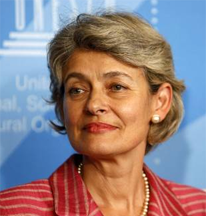
The Executive Board is composed of members from each of six Electoral Groups, and each member of the Executive Board is thus to represent not only his own country but the countries of the corresponding Electoral Group. The following shows the Electoral Groups from which the Directors General have been elected:
- Group I (Western European and North American States): Federico Mayor (Spain, 1987-1999); René Maheu (France, 1962 – 1974 (acting DG 1959, 1961-1962)); Vittorino Veronese (Italy, 1958 – 1961); Luther Evans (United States, 1953 – 1958); John W. Taylor (United States, 1952 – 1953 (acting DG)); Julian Huxley (United Kingdom, 1946 – 1948)
- Group II (Eastern European States): Irina Bokova (Bulgaria, 2009 to present)
- Group III (Latin-American and Caribbean States): Jaime Torres Bodet (Mexico, 1948 – 1952)
- Group IV (Asian and Pacific States): Koïchiro Matsuura (Japan, 1999-2009)
- Group Va (African States): Amadou-Mahtar M’Bow (Senegal, 1974-1987)
- Group Vb (Arab States): none The candidate chosen this year will be expected to serve through 2017.
Will Bokova keep the post for Group II for the traditional second term, or could Maila or Farah steal it away for their respective regions?
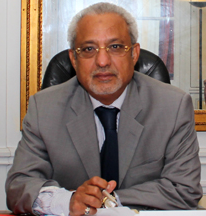
The Executive Board will apparently follow the same procedures in this election as it did in 2009. Members will vote by secret ballot. The first candidate to receive a majority of the votes will be chosen; if no candidate obtains a majority in the first four ballots, the fifth vote will be limited to the two candidates who received most votes in the fourth ballot.
While elections in UNESCO are always one country-one vote, the assessed contributions of member states differ greatly. (They are based on ratios defined by the United Nations General Assembly.) Countries have assessments based on GDP and per capita GDP; thus the United States is assessed 22% of the regular budget, Japan 12.5%, Germany 8%, the United Kingdom 6.6% and France 6.1%. At the other extreme, countries such as Belize, Bhutan and Vanuatu are assessed 0.001% of the regular budget. The wealthier member states may have more influence than their single electoral votes might suggest, if only because they can afford to assign more staff to UNESCO affairs.
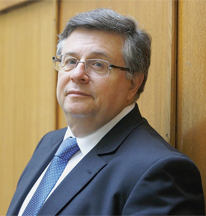
UNESCO rules deny voting privileges to countries that are two years or more in arrears of their assessed contributions. The United States has been withholding contributions to UNESCO since 2011. (A provision of U.S. law required this because UNESCO had accepted Palestine as a member state.) Therefore, unless the United States pays its assessed some or all of its assessed contributions before this year’s General Conference, its voting privileges will be revoked. It can be expected that its influence on the election of Director General would thereby be reduced.

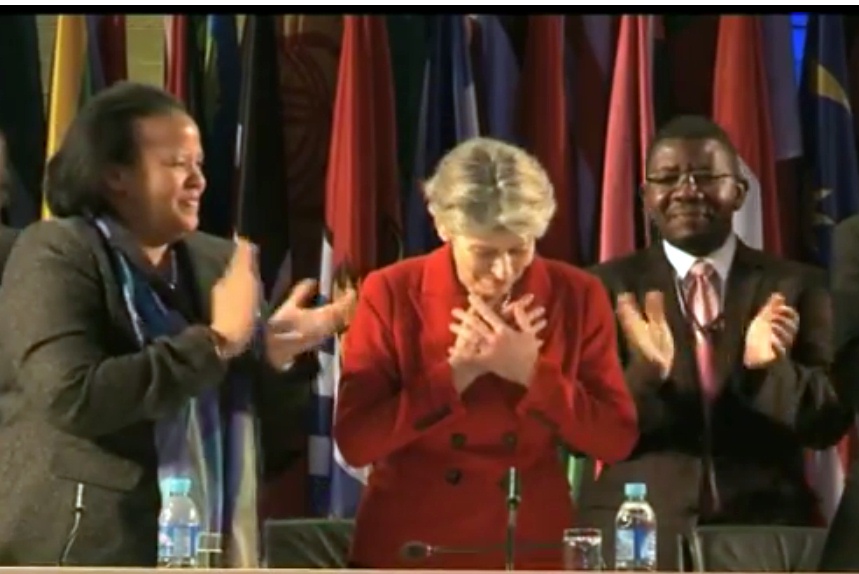
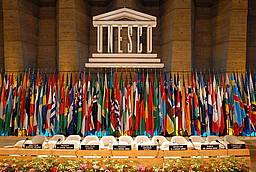

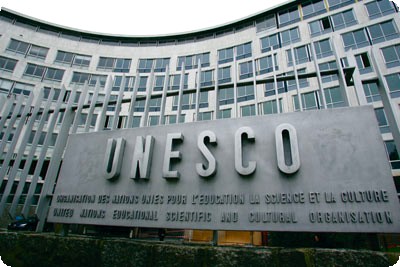
Thank you, Mr John Daly! 🙂
There seems to be rumors that Mme Irina Bokova will not seek a second term? Any information on this?
There are continuing rumors on this, but her governments continues to promote her re-election. Feel free to share any speculation and leads that you hear and we’ll follow up.